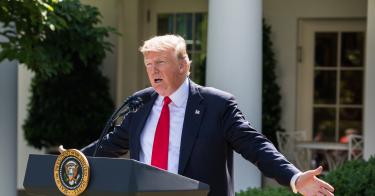President Donald Trump announced today that the United States will be withdrawing from the Paris climate agreement.
“This is a welcome decision from President Trump and a commonsense approach that helps the American people and businesses,” says Heritage Foundation President Edwin Feulner.
“Heritage experts have long been ringing the alarm bell of the damaging effects staying in the Paris climate agreement would have on our economy. From lost jobs, higher electric bills, or more overzealous government regulations, the Paris Agreement was by all accounts a rotten deal.”
Nick Loris, Heritage’s Herbert and Joyce Morgan fellow in energy and environmental policy, says
Heritage research projected this agreement would cost the average family of four $20,000 by 2035. “It’s the exact opposite of the ‘Make America Great Again’ agenda President Trump promised to pursue. Au revoir to the Paris Agreement indeed," said Loris.
Just last month Trump cited Heritage Foundation research on the agreement during a speech in Harrisburg, Pennsylvania, that marked his 100th day in office.
"It is estimated that for compliance with the agreement could ultimately shrink America’s GDP by $2.5 trillion over a 10-year period,” said Trump.
The figure is drawn from a report by Heritage experts Loris, Kevin Dayaratna, and David Kreutzer. They concluded that the Paris climate accord would inflict devastating economic costs for practically no environmental benefit.
This is not the first time the Trump White House has relied on Heritage research on climate change regulations. In March, Trump issued an executive order undoing an Obama-era policy requiring the Environmental Protection Agency to consider the “social cost of carbon” when making regulations.
Trump’s order was inspired by years of Heritage research that found the EPA’s models were fundamentally flawed.
“Our experts' rigorous research and work has brought us to the point we are at today and it serves as a great testament to the impact Heritage scholars continue to have on the nation’s most important policy debates,” said Feulner.
“Over the past decade, Heritage staff produced the groundbreaking analysis that demonstrated how the economics, environmental assumptions, statistical models, and legal framework used to support schemes like the Paris Agreement were systemically flawed,” said Jack Spencer, vice president for Heritage’s Institute for Economic Freedom and Opportunity. “In the end, there simply was not a single argument that the global warming alarmists could put forward that Heritage experts could not crush.”
Feulner; Spencer; Dayaratna, Mollie McNeill, a Heritage Research Assistant, Bridgett Wagner, acting vice president of policy promotion at Heritage; and Michael Needham, CEO of Heritage Action for America, were invited and attended the announcement of the withdrawal from the agreement in the Rose Garden.
